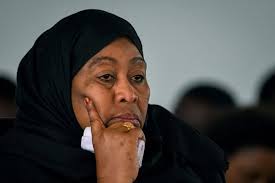Perceived critics either disappearing, arrested or detained, publications banned and political opponents neutralised – these are some of the recent blemishes to Tanzania’s democratic reputations ahead of national elections.
Observers say this intemperate climate hearkens back to the ‘repressive’ days of late president John Magufuli who brooked no open criticism of his regime and never hesitated to ban publications which published things his government did not like.
Things were moving away from this supposedly repressive climate when Samia Sulu Hassan took over the rein after Magufuli’s death in 2021.
Many Tanzanians celebrated the opening up of the political space under Samia in which politicians, critics and activists of all stripes found their voice without fear of a government-sanctioned clampdown. Four newspapers which the Magufuli-led regime had banned were quickly allowed back to operational mode.
The Media Services Act of 2016 were used to ban Daima, Mawio, Mwanahalisi and Mseto newspapers after a string of reports exposing corruption. Samia had earned the goodwill of the press after her government rescinded the bans.
However fast -track to 2024 and the climate is today unrecognizable from those earlier days when many hoped Tanzania was turning a corner, with even the press joining in ”handing flowers” to Samia as a rare sign of affection.
As Tanzania inches closer to elections exactly a year from now, disaffection has set in and there is widespread fear that the government is restricting the political space to determine and control the outcome of the next elections.
The press feels hard done by. Its practitioners have been particularly hit hard by the government’s hard approach towards perceived critics.
Tanzania’s main daily publications were recently slapped bans after animation clips they had published were adjudged to have been critical of the president. The ‘offending’ newsapers are the Citizen, Mwananchi and Mwanaspoti whose licenses have been revoked for a thirty-day period. Samia Suluhu Hassan’s government is comng under strong criticism for ‘gradually closing off the political space’ by pursuing opponents for arrest, detention and in some cases physical liquidation.
Some say her government’s reaction to recent audiovisual revealed the extent to which it had changed from being tolerant to being one of the more intolerant regimes in Africa over the past three years.
Before it was banned and eventually removed from the sites that published them, the animation in question showed a hijabi female identical to Samia switching to different television channels which were voicing criticism about recent detentions, abductions and killings – complants which rubbed the character the wrong way.
The Tanzania Communications Regulatory Authority (TCRA) said the content is in violation of the 2020 Electronic and Postal Communications (Online Content) Regulations but rights watchdogs have criticised the ban as gagging the local media and intimidating Tanzanians from attempting to demonstrate their right to take the government to account.
Although the government had carried out some measure of reform since President Samia Suluhu Hassan came to power, her love-lost with the press is likely to provoke more robus scrutiny of her intentions against the backdrop of Tanzania’s presidential elections next year. After fending off hardliners inspired by Magufuli, Samia appears to be navigating criticism from within and without using her predecessor’s muscular tactics against critics including the press.
As indicative of suddently changing tack in favour of the Magufuli approach, President Samia has gone from firing ardent Magufulists of the ruling Chama Cha Mapinduzi party like Doto Biteko who she appointed as Deputy Prime Minister. According to the Institute for Security Studies (ISS), Samia has backpeddaled on a review of the country’s constitution which were a crucial part of those reforms.
”Perhaps the appointment that bothered democratic reformists most was that in October 2023 of Paul Makonda – widely disliked by the opposition – to the role of ideology and publicity head in the ruling Chama Cha Mapinduzi (CCM) party. This year started more encouragingly with Makonda’s transfer from that more important post to the governorship of Arusha”.
Nicodemus Minde, a researcher with ISS describes Samia’s moves as ”strategic political manoeuvres to protect her from the Magufulists”.
Whatever happens in 2025, what cannot be missed is Africa’s only female president fighting on different fronts to keep her regime alive and this may include closing off the political space.
WN/as/APA


